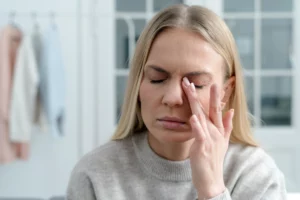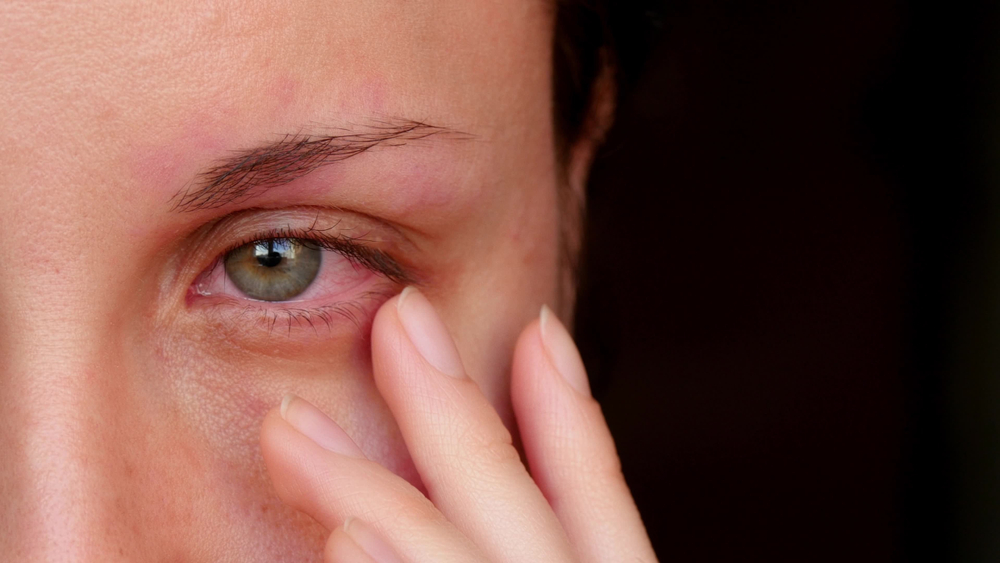Alcohol abuse takes a disproportionate toll on certain groups. Nearly 70% of alcohol-related deaths are men, and nearly 32% are aged 50 to 64. Excessive drinking also kills nearly 4,000 Americans under 21 each year, and 96.5% of teen deaths are from acute causes like car accidents.
One of the most common impacts of alcohol abuse is alcohol eyes. “Alcohol eyes” refers to vision problems and eye damage caused by long-term, heavy alcohol use. The medical term is alcoholic ophthalmopathy, but most people know it as alcohol eyes.
The more you drink and the longer you drink heavily, the more severe and permanent the damage can become. The good news is quitting alcohol and following a healthy lifestyle can prevent further damage. It may even improve some vision problems, though significant vision loss cannot be reversed.

How Does Alcohol Use Disorder Harm Our Eyes?
Excessive alcohol consumption over time can wreak havoc on your eyesight and eye health. The toxic effects of alcohol harm the eyes in several ways:
- Dehydration. Alcohol is a diuretic, meaning it dehydrates the body. This includes your eyes. Dehydration leads to dry, irritated eyes and can cause damage to the cornea and other eye tissues.
- Blood vessel changes. Drinking too much alcohol causes blood vessels in the eyes to swell and become visible. This condition, known as alcohol eyes, causes the whites of the eyes to appear red or pink. These swollen blood vessels can potentially burst, leading to eye bleeding.
- Vision problems. Prolonged, heavy alcohol use often leads to vision issues like blurred or double vision, color vision deficiency, and difficulty seeing objects in low light. These vision problems may become permanent if alcohol misuse continues unchecked.
- Other eye diseases. Excessive drinking over many years dramatically increases the risks of developing serious eye diseases and conditions such as age-related macular degeneration, glaucoma, cataracts, and optic neuropathy.
The negative effects tend to worsen and become more irreversible the longer and more heavily you drink. The good news is that quitting alcohol and receiving treatment can help prevent further damage and, in some cases, even reverse certain effects. Your eyes will certainly thank you for kicking the habit.

Common Symptoms of Alcohol Eyes
As alcohol consumption increases, you may start to notice changes in your vision and eyes. Here are some of the common symptoms of “alcohol eyes” to be aware of:
Blurry Vision
Excessive alcohol intake can cause blurred vision, making it difficult to see details or focus on objects. This blurriness is usually temporary, but chronic or long-term alcohol use may lead to permanent vision damage.
Double Vision
Seeing double or two overlapping images is another sign that you’ve had too much to drink. Double vision occurs when the eyes have trouble coordinating, causing each eye to see images separately.
Light Sensitivity
Are lights too bright when you’ve been drinking? Sensitivity to light, also known as photophobia, is a symptom of alcohol eyes. Normal light levels may seem too harsh or glaring. Wearing sunglasses may provide some relief.
Eye Redness and Irritation
Alcohol consumption often leads to bloodshot, red eyes. The small blood vessels on the whites of the eyes become enlarged, causing a reddish appearance. You may also experience dry, itchy eyes or an irritated sensation.
Migraine Development
For some people, heavy alcohol use triggers the onset of severe headaches, known as migraines. The dehydrating effects of alcohol and changes in blood flow are thought to lead to migraine development in susceptible individuals.
Treating Alcohol Eyes
Once alcohol eyes have been diagnosed, the treatment plan will depend on the severity of symptoms and underlying conditions. The good news is that many vision issues caused by alcohol consumption are reversible with proper care and lifestyle changes.
Corrective Lenses
Corrective lenses or glasses can help improve sight for blurred or distorted vision. Your eye doctor will examine your eyes to determine the right lens prescription to get you seeing again.
Eye Drops
Over-the-counter eye drops can help reduce bloodshot eyes and relieve irritation. Look for drops containing redness relievers like Visine-A that reduce eye inflammation. Your doctor may prescribe medicated eye drops for more severe or persistent redness.
Additional Treatments
For more severe cases of alcohol eyes or damage to the optic nerve, additional treatment like surgery or medication may be required. Your ophthalmologist will determine the best approach based on a comprehensive eye exam and assessment of your symptoms and medical history.
Alcohol Abuse Can Take a Toll on Your Eyes
If you experience any vision issues and are concerned about your alcohol use, help is available at MD Home Detox. Call our admissions staff at 1 (888) 592-7931 or complete our confidential contact form to get started on your healing process. We offer flexible treatment programs to help clients overcome addiction and move into recovery.
Addiction affects people from all walks of life. Don’t hesitate to reach out – we are here to help you through each step. Your vision and health are worth fighting for, so take the first step today toward improving your eyesight and overall well-being by addressing problematic alcohol use. With treatment and lifestyle changes, alcohol eyes and related damage can often be reversed. You deserve to see clearly and live free from addiction.

